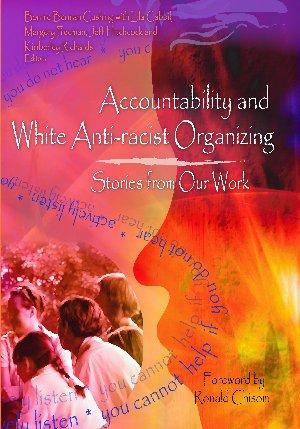Accountability and White Anti-racist Organizing: Stories from Our Work

“Actively listen... You cannot help if you do not hear... Actively listen...” These words swirl across the cover of Accountability and White Anti-racist Organizing: Stories from Our Work. The book is a collection of eleven articles by white anti-racist activists reflecting on their experiences with accountability. Almost all of the contributors trace their activist roots back to Undoing Racism™ trainings from the People's Institute for Survival and Beyond (PISAB), and in fact the book opens with a foreword by Ronald Chisom, co-founder and executive director of PISAB. Contributors also have ties to other prominent white anti-racist organizations, including the Challenging White Supremacy Workshop (CWS) and the White Privilege Conference.
What is accountability? In the book's introduction, the editors write, “Accountability in the traditional sense implies an underlying power that can administer sanctions, but if there are no sanctions, if one is in the power position, why be accountable, and who can hold you to it? So accountability as we view it in regard to white anti-racist organizing is about a willingness to share power.”
Some of the book's contributors focus on philosophies or systems of accountability. For example, Shelly Tochluk and Cameron Levin, of AWARE-LA (Alliance of White Anti-Racists Everywhere – Los Angeles) and RJA (Racial Justice Alliance) describe the model for accountability they have developed, entitled Transformative Alliance Building. They emphasize “two-sided accountability” (between white people and people of color) in contrast to “one-sided” models that emphasize white accountability to people of color without discussing the necessity for reciprocity. One-sided accountability, they claim, leaves white activists mired in white guilt, which causes them to believe that they are incapable of taking full responsibility for tasks they should shoulder (such as organizing other white people against racism). This in turn prolongs the burden of over-dependence on activists of color.
Other articles focus on “applied accountability.” Larry Yates writes about his long tenure with the National Low-Income Housing Coalition/Low Income Housing Information Service (LIHIS). Thanks initially to the conditions of receiving grant money from the Catholic Campaign for Human Development, a majority of LIHIS Board members were people directly impacted by the issue at hand: current or former residents of public or assisted housing. “These funder requirements,” writes Yates, “gave the LIHIS Board a clear framework of accountability.” He describes how this, along with other aspects of the organization's institutionalized commitment to tenant self-determination, helped LIHIS develop a national grassroots base that was able to act effectively on both local and national levels to change HUD (Department of Housing and Urban development) policy.
I appreciate this collection especially for its focus on telling “Stories from Our Work.” This is not a book about pedagogy or identity development, about “how to get more white people to take on an anti-racist outlook.” This is a book about action, about implementing an anti-racist outlook in a sustained way in specific contexts. Additionally, it is not a book about individual white heroes or heroines. It is a book about movement-building, about creating and sustaining networks of people that can support each other in doing long-term coordinated work. These are stories that I want and need to hear as a young white anti-racist activist.
Additionally, it makes sense for a book about white anti-racist activism to focus on the concept of accountability. As each contributor describes in his/her own way, white privilege grants disproportionate access to systems, institutions, and resources. The task of white anti-racist activism is not to deny the truth of that access in order to seek individual absolution. Rather, the task must be to leverage that access strategically (or to put it more bluntly, to work within the system in one way or another) to bring about radical change. The key challenge, as this book hashes out in eleven different contexts, is to do that work without losing the focus on ending racism—in other words, to be accountable to people of color, and to each other as well.